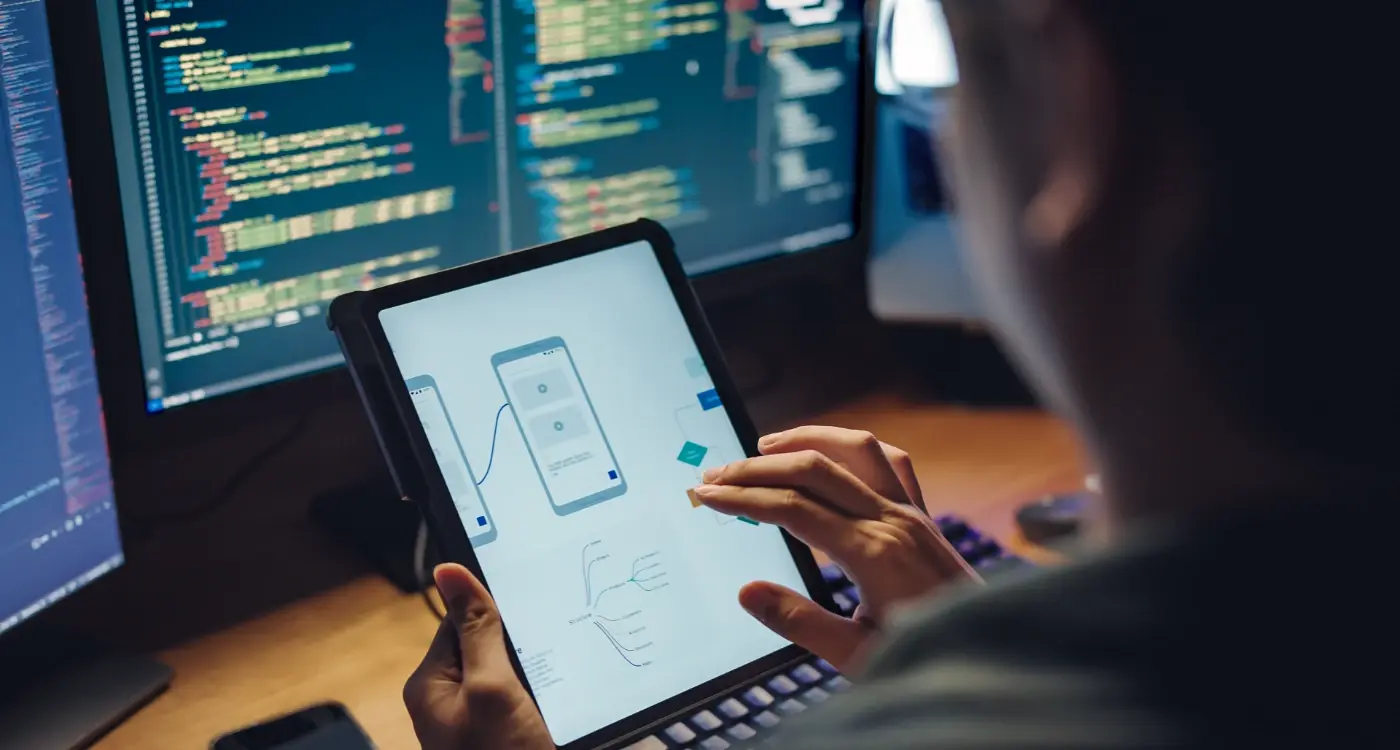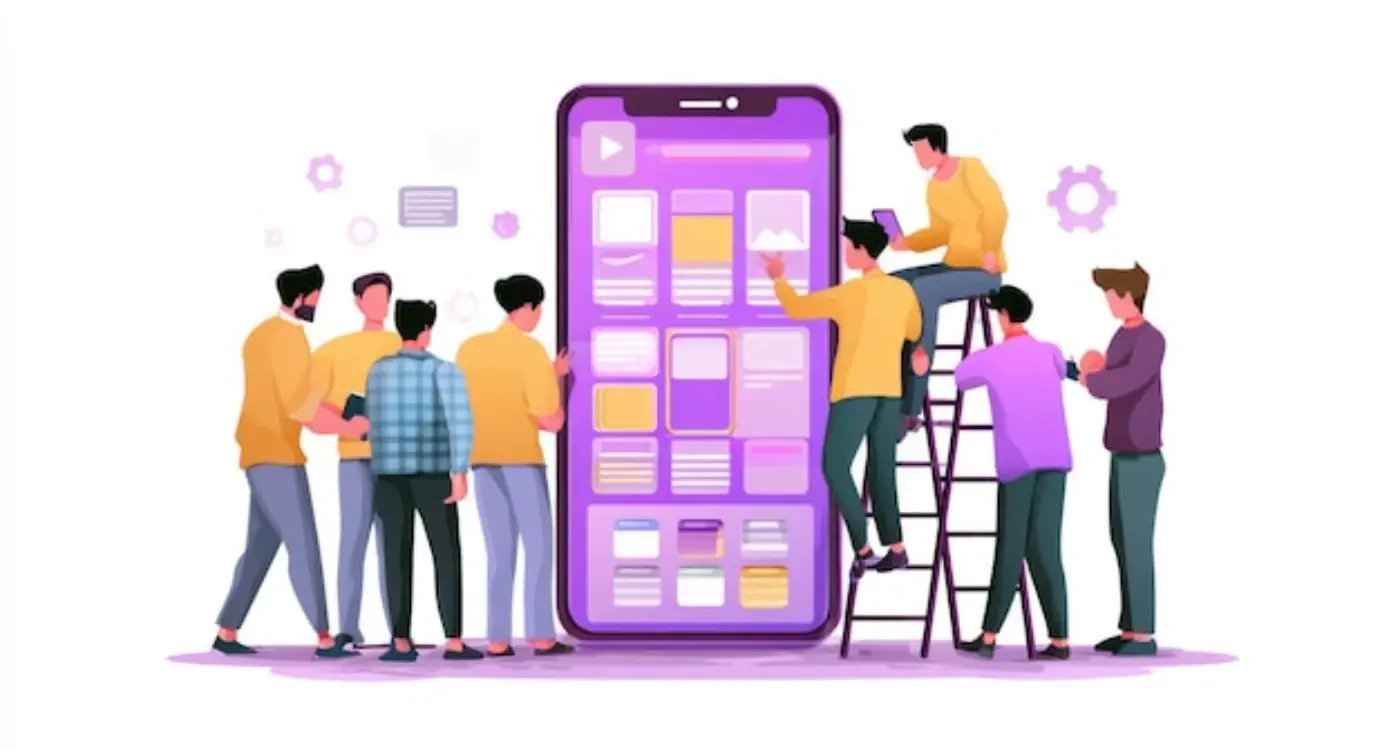What Due Diligence Steps Matter Most in Developer Selection?
Apps developed by properly vetted teams have retention rates that are roughly four times higher than those built by hastily chosen developers. That's not just a number—it's the difference between building a business and burning through your budget with nothing to show for it. I've seen too many companies rush into partnerships with developers who looked good on paper but fell apart when it came to actual delivery.
The thing is, choosing the right app developer isn't like hiring someone to mow your lawn. You're essentially handing over your vision, your budget, and often your business's future to people who might be thousands of miles away. Get it wrong and you'll end up with an app that crashes constantly, looks like it was designed in the early 2000s, or worse—never gets finished at all.
Most businesses approach developer selection backwards. They focus on price first, maybe glance at a portfolio, then hope for the best. But the companies that build successful apps? They treat developer selection like they're hiring a senior executive—because in many ways, that's exactly what they're doing.
The most expensive developer is the cheap one who can't deliver what you need
Over the years, I've developed a systematic approach to evaluating development teams that goes far beyond just looking at their previous work. It's about understanding how they think, how they communicate when things go wrong, and whether they truly understand your business needs. The developer due diligence process I'm about to walk you through has saved my clients countless hours of frustration and hundreds of thousands of pounds in wasted development costs.
Technical Skills Assessment
Right, let's talk about the technical stuff—because this is where things can go properly wrong if you're not careful. I've seen too many clients get dazzled by flashy presentations only to discover later that their chosen developer can't actually build what they've promised. It's a bit mad really, but it happens more often than you'd think.
The first thing I always tell people is don't just take their word for it when they say they know React Native or Swift. Ask for specifics. What version of iOS SDK have they worked with most recently? How do they handle state management in their apps? These aren't trick questions—any decent developer should be able to answer them without breaking a sweat.
Key Technical Areas to Evaluate
Here's what you need to dig into when assessing technical capabilities:
- Platform expertise (native iOS/Android vs cross-platform)
- Backend integration and API development experience
- Database design and management skills
- Security implementation and data protection
- Performance optimisation techniques
- Testing methodologies and quality assurance
- App store submission and approval processes
But here's the thing—technical skills aren't just about coding. I mean, sure, they need to write clean code that doesn't crash every five minutes. But they also need to understand the business side of things. Can they advise you on whether your feature ideas are technically feasible? Do they know about app store guidelines that might affect your launch?
One red flag I always watch for is developers who claim they can do everything perfectly. Nobody's that good at every single technology. The best developers I know are honest about their strengths and will bring in specialists when needed. That's the kind of team you want on your side.
Portfolio and Past Work Review
Looking through a developer's portfolio is where things get real. I mean, anyone can talk a good game about their technical skills, but their past work? That tells the actual story of what they can deliver.
When I'm reviewing portfolios—and trust me, I've seen some absolute shockers over the years—I'm not just looking at how pretty the apps look. Sure, good design matters, but I'm digging deeper than that. I want to see apps that are still live in the app stores, not just screenshots from projects that mysteriously disappeared. If an app isn't available anymore, that raises questions. Was it poorly built? Did it fail commercially? There might be perfectly valid reasons, but you need to ask.
Pay attention to the variety of projects they've tackled. A developer who's only built simple informational apps might struggle with your complex e-commerce platform. Look for projects that match your requirements in terms of functionality, not just industry. If you need user authentication, payment processing, or real-time features, make sure they've successfully implemented these before.
Download and actually use the apps in their portfolio. Spend 10 minutes clicking through each one—you'll quickly spot issues with performance, user experience, or basic functionality that screenshots can't reveal.
Check the app store ratings and reviews too. Users don't hold back when apps are buggy or poorly designed, and those reviews will give you insight into the developer's attention to quality. Also look at how recently the apps were updated; apps that haven't been touched for years suggest the developer might not provide ongoing support.
One more thing—ask about their role in each project. Were they the lead developer, part of a team, or just handling a small piece? Understanding their actual contribution helps you gauge whether they can handle your entire project scope.
Right, let's talk about something that can save you from making a costly mistake—actually speaking to the people who've worked with your potential app developer before. I mean, you wouldn't hire a babysitter without checking references, would you? Same principle applies here, except we're talking about potentially hundreds of thousands of pounds and months of your time.
Here's the thing though; not all references are created equal. When a development agency gives you their reference list, they're obviously going to put forward their happiest clients. That's just business sense. But even with that caveat, you can still learn loads from these conversations if you ask the right questions.
Start with the basics—did they deliver on time? Was the final product what was promised? But then dig deeper. Ask about communication during stressful moments. How did they handle unexpected challenges? What happened when bugs were discovered after launch? These are the moments that reveal a developer's true character.
One thing I always tell prospective clients is to ask for references from projects that went sideways. Honestly, every developer has had projects that didn't go according to plan—if they say they haven't, that's a red flag right there. What matters is how they handled those situations and whether the client would still work with them again.
And here's a pro tip—try to speak to clients who worked with them at different stages of their business. A developer who was great five years ago might have grown too quickly and lost their personal touch. Or conversely, they might have learned from early mistakes and become much stronger. The trajectory tells you as much as the individual data points.
Don't just rely on written testimonials either. Anyone can write those. Actual phone conversations reveal so much more through tone and the things people don't say as much as what they do.
Communication and Project Management Style
You know what kills more app projects than technical issues? Poor communication. I've seen brilliant developers lose clients simply because they went silent for weeks, leaving everyone wondering if the project was still alive. When you're vetting developers, pay close attention to how they communicate during the selection process—it's a preview of what's coming.
Ask them about their project management approach. Do they use tools like Slack, Trello, or Asana? How often do they provide updates? A good developer will have a structured process for keeping you in the loop. They should be able to explain their methodology clearly—whether they work in sprints, use agile development, or follow a more traditional waterfall approach.
Response Times Matter
Test their responsiveness during your initial conversations. If they take three days to reply to a simple question now, what happens when you need urgent changes later? I always tell clients to note how developers handle communication pressure—do they get defensive when asked about timelines, or do they explain potential challenges openly?
The best developers I work with treat communication as part of the service, not an interruption to their coding time
Look for developers who ask questions about your business goals, not just technical requirements. They should want to understand why certain features matter to your users. If a developer seems more interested in showing off their technical skills than understanding your actual needs, that's a red flag. The right developer becomes an extension of your team, offering insights and suggestions that improve the final product.
Budget and Timeline Transparency
Here's where a lot of relationships go wrong before they even start—dodgy pricing and unrealistic timelines. I've seen too many projects fail because the developer wasn't upfront about costs or promised the world in half the time it actually takes. When you're vetting developers, you want complete transparency on both fronts.
A good developer will break down their pricing structure clearly. They should explain whether they charge hourly rates, fixed project fees, or use milestone-based billing. More importantly, they need to be honest about potential additional costs—things like third-party integrations, app store fees, or changes in scope. If someone gives you a single number with no breakdown, that's a red flag; professional developers know that app development has many moving parts, each with its own cost implications.
Getting Realistic Timeline Estimates
Timeline transparency is just as important as budget clarity. Any developer who promises to build your app in a few weeks is either lying or planning to deliver something that barely works. Quality app development takes time—there's design phases, development sprints, testing periods, and revision cycles to consider.
Ask for a detailed project timeline that includes milestones, dependencies, and buffer time for unexpected issues. Because trust me, there are always unexpected issues! The best developers will also explain how they handle scope changes and timeline adjustments. They should have a clear process for communicating delays and managing expectations when things don't go according to plan.
Look for developers who ask detailed questions about your requirements before giving estimates. If they're quoting you without understanding what you actually need, those numbers are meaningless. Good developers take time to understand your project properly before committing to any timeline or budget. Understanding cost differences between traditional development and AI-powered approaches can also help inform your budget planning discussions.
Team Structure and Availability
Here's something that catches people off guard—you're not just hiring one developer, you're usually working with a whole team. And honestly, understanding who's actually going to be working on your project is bloody important. I've seen too many clients get burned because they thought they were getting the senior developer they met in the initial pitch, only to find out their project got handed off to the junior team member.
When you're doing your developer due diligence, ask straight up: who will be working on my project? What are their specific roles? How much experience does each team member have? A good development agency will be transparent about their team structure. They'll tell you if they have designers, developers, project managers, and QA testers—or if one person is wearing multiple hats.
The availability question is equally important. Sure, a developer might have impressive skills and a great portfolio, but if they're juggling five other projects simultaneously, your app is going to suffer. Ask about their current workload and how many active projects they typically handle at once. You want to know you're getting proper attention, not just squeezed in between other commitments.
Ask to see their project timeline with buffer time included. Good developers build in extra time for unexpected issues—if everything looks too perfectly scheduled, that's a red flag.
Also worth noting—find out what happens if a key team member leaves during your project. Do they have backup resources? How do they handle knowledge transfer? These aren't fun questions to ask, but they're part of proper vetting. The best agencies have processes in place for these situations because, well, life happens and people move on.
Post-Launch Support and Maintenance
Here's something most clients don't think about until its too late—what happens after your app goes live? I mean, launching your app is just the beginning, not the finish line. The real work starts when users begin downloading and actually using your product.
When I'm evaluating potential development partners, I always dig deep into their post-launch support policies. Why? Because apps aren't like websites that you can just set and forget. Mobile operating systems update constantly; iOS and Android release major updates every year, plus countless smaller patches. Your app needs to stay compatible, or it'll simply stop working for users.
What Support Actually Looks Like
Good developers will offer different tiers of maintenance support. Some focus purely on keeping your app functional—fixing bugs, updating for new OS versions, and maintaining basic performance. Others go further, providing analytics reviews, user feedback analysis, and recommendations for improvements based on real usage data.
But here's the thing—you need to understand exactly what you're getting. I've seen too many clients caught off guard by support costs, or worse, left with an app that breaks after an iOS update because their developer vanished.
Key Support Elements to Evaluate
- Response times for critical bugs versus minor issues
- OS compatibility update timeframes (usually within 2-4 weeks of major releases)
- Monthly or quarterly performance reports and recommendations
- Server maintenance and security updates if applicable
- App store submission support for updates
- User feedback monitoring and analysis
Ask potential developers about their longest-running client relationships. The best agencies maintain apps for years, not months. They understand that your apps success depends on ongoing attention, not just a perfect launch.
Legal and Security Considerations
Right, let's talk about the stuff that keeps business owners up at night—legal and security issues. I've seen too many projects go sideways because someone skipped the boring paperwork bits. Trust me, it's worth getting this right from the start.
First thing you need to check is whether your potential developer has proper contracts in place. And I don't mean some dodgy template they downloaded online. Look for detailed agreements that cover intellectual property rights, confidentiality, liability, and what happens if things go wrong. Because they sometimes do! You want to make sure you actually own the code they're writing for you—you'd be surprised how many developers try to retain rights to reuse your app's code elsewhere.
Data Protection and Security Standards
GDPR isn't going anywhere, and neither are the other privacy regulations popping up around the world. Your developer needs to understand data protection laws inside and out; not just the technical side, but the legal requirements too. Ask them about their security practices—how do they handle sensitive data during development? Do they use secure coding practices? Have they ever dealt with a data breach?
A good developer will have insurance, proper contracts, and a clear understanding of data protection laws—these aren't nice-to-haves, they're must-haves in today's regulatory environment
Don't forget about insurance either. Professional indemnity insurance might seem like overkill, but if your app handles user data (and let's face it, most do), you want to know your developer is covered if something goes wrong. It shows they take their responsibilities seriously and protects both of you if legal issues arise down the line.
Conclusion
Right then—you've got all the pieces now. The technical assessments, portfolio reviews, reference checks, and everything in between. But here's what I want you to remember: choosing the right developer isn't just about ticking boxes on a checklist.
After working with hundreds of clients over the years, I can tell you that the best partnerships happen when there's genuine alignment. Sure, technical skills matter (obviously!), but so does finding someone who actually gets your vision. Someone who asks the right questions, challenges your assumptions when needed, and makes you feel confident about the journey ahead.
The developers worth working with will be transparent about timelines, upfront about potential challenges, and honest when something doesn't make sense. They'll have processes in place, references who speak highly of them, and a portfolio that shows genuine results—not just pretty screenshots.
Don't rush this decision. I know it's tempting to go with the first developer who seems decent or the cheapest quote you receive. But your app is going to represent your business in your customers' pockets. That's not where you want to cut corners.
Take time to really evaluate each candidate against the criteria we've covered. Ask the tough questions about post-launch support, security practices, and what happens if things go wrong. The right developer won't be put off by thorough due diligence—they'll respect you for it.
Your app deserves a team that's as invested in its success as you are. When you find that match, you'll know it. And honestly? That's when the real magic happens.
Share this
Subscribe To Our Learning Centre
You May Also Like
These Related Guides

How Do You Set Up Version Control for Mobile Development Teams?

What Strategies Work Best for Managing App Development Teams?



